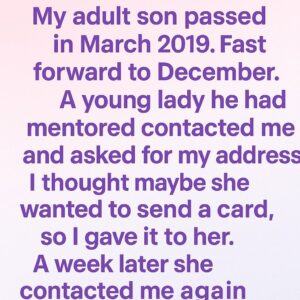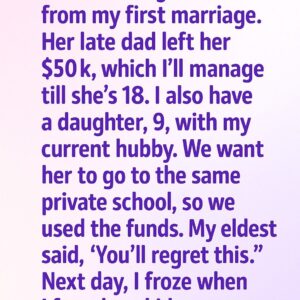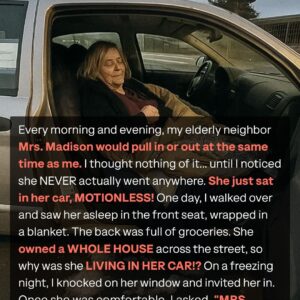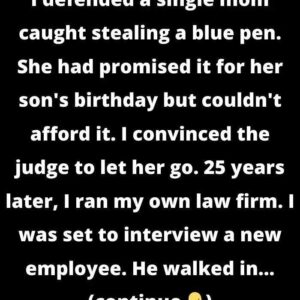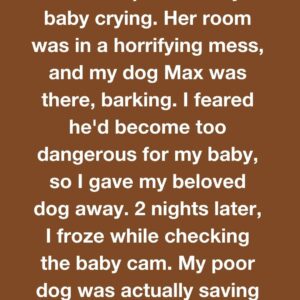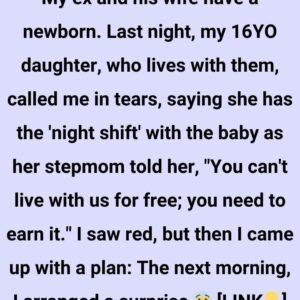When my best friend, Claire, showed up at my door the night her marriage collapsed, she looked like a ghost of herself. Her hair was tangled, her voice cracked from crying, and she clutched a small suitcase like it was the only thing keeping her upright. She didn’t have to ask. I just opened my arms. “Stay as long as you need,” I told her.
My husband, Adam, agreed instantly. “Of course,” he said. “She shouldn’t be alone right now.”
So Claire moved into the guest room—the one with the soft gray walls and the window that looked out to the maple tree. The first week, she barely spoke. She slept late, spent her days wrapped in blankets, and stared at the TV without really watching. I’d make tea, leave meals by her door, and remind her to eat. It was what any friend would do.
At first, it felt good—right, even. Like I was doing something that mattered. Helping her pick up the broken pieces. But grief is unpredictable. It seeps into the walls, into conversations, into silences that should’ve been comfortable but weren’t anymore.
Weeks passed. Claire began to rejoin life. She’d hum while cooking breakfast, laugh at Adam’s jokes, and slowly color returned to her cheeks. I was happy to see her healing. That’s what I told myself, anyway.
But something shifted that I couldn’t name.
It was small things at first. The way Adam lingered in the kitchen when she was there. The way she looked at him when she thought I wasn’t watching—grateful, warm, but something else too. One night, I came downstairs to find them talking softly over a bottle of wine. Their laughter stopped when I entered. “We were just reminiscing,” Claire said quickly, eyes darting away.
I brushed it off. They’d known each other for years. Adam had been around as long as she had. It made sense they’d find comfort in familiar company. I trusted them both completely—or at least I thought I did.
Then came the grocery store.
I was pushing a cart through the produce section when I heard my name. Claire’s ex-husband, Jake, was standing by the apples, looking thinner and tired but strangely calm. I hadn’t seen him since the divorce. I smiled awkwardly. “Hey, Jake. How are you holding up?”
He shrugged. “Better than I was. You?”
We exchanged small talk until I mentioned that Claire was staying with us for a while. His expression changed—something between amusement and pity. Then he gave a short laugh and said, “Oh. So you don’t know.”
“Don’t know what?” I asked, but he just shook his head. “Nothing. Forget it.” Then he walked away, leaving me standing there, heart pounding, trying to make sense of his tone.
The rest of that day, I couldn’t stop replaying it. So you don’t know. What was I supposed to know?
Back home, I started noticing things I hadn’t before. Their voices dropping to whispers when I entered a room. The quick exchanges of glances. The half-closed door to the guest room when Adam passed by. Maybe it was all innocent. Maybe I was imagining things. But once doubt enters, it doesn’t leave quietly.
That night, I told myself I wouldn’t go to bed with questions festering. I gathered my courage, walked into the living room where they were sitting, and said, “We need to talk.”
Claire froze, a mug halfway to her lips. Adam looked up from his phone.
“I saw Jake today,” I said. “He said something… strange. And it made me realize there are things I don’t understand anymore. About us. About what’s going on in this house.”
For a long, heavy moment, no one spoke. Then Claire set her mug down and said softly, “You’re right. You deserve the truth.”
My stomach twisted. “So there is something.”
Adam reached for my hand, but I pulled back. “Let her talk,” I said.
Claire took a shaky breath. “It’s not what you think. I’m not sleeping with your husband, and I never would. But… I have leaned on him more than I should have. He’s been kind when I didn’t deserve kindness. And maybe I let that feel like something more.”
Adam’s jaw tightened. “It wasn’t like that,” he said. “She needed someone to talk to. I just listened. Maybe too much.”
The words didn’t make me angry—they just made me tired. “So you confided in each other, not me. The one person who opened the door for both of you.”
Claire’s eyes filled. “I didn’t mean to hurt you. You’ve always been the strong one. I didn’t want to add to your load.”
I let out a hollow laugh. “And instead, you added distance.”
We sat there in that raw silence, all of us realizing how far we’d drifted without meaning to. It wasn’t betrayal in the traditional sense—no affair, no lies about late nights—but it was still something broken. Trust doesn’t only collapse from grand acts. Sometimes it erodes quietly, one secret at a time.
After that night, we made changes. Boundaries. No late-night talks. No open-door emotional rescues that left others in the dark. It wasn’t easy, but we did the work. Adam and I spent weeks in therapy, learning how to talk honestly again. Claire found an apartment across town, small but bright, with sunlight streaming through the windows. When I helped her move, we both cried.
“I don’t deserve your forgiveness,” she said.
“Maybe not,” I answered. “But friendship isn’t about deserving. It’s about deciding whether it’s worth rebuilding.”
And I decided it was.
Months passed. We started finding our way back to something that resembled normal. Different, quieter, more intentional. Claire came for dinner sometimes. Adam and I stopped pretending we didn’t need to check in with each other. We learned to name the small cracks before they became earthquakes.
One evening, after she’d left, Adam turned to me and said, “Do you ever wish we hadn’t let her in?”
I thought about it—the chaos, the doubt, the hurt. But also the growth that followed. “No,” I said finally. “I wish we’d communicated better. But I don’t regret helping her. It showed us what we still needed to fix.”
Looking back, I realize that day in the grocery store was never really about what Jake knew. It was about what I didn’t—how blind I’d been to the quiet distances forming in my own home. His words forced me to look harder, to ask harder questions, to face truths I’d ignored for too long.
In the end, no one was the villain. We were three people carrying pain, trying to find comfort, and making mistakes along the way. But sometimes, that’s how healing works—it’s messy, ungraceful, and full of lessons that arrive disguised as heartbreak.
If you ask me what I learned from it all, it’s this: trust isn’t just about believing someone won’t betray you. It’s about staying brave enough to ask when you’re afraid of the answer.
The hardest conversations don’t destroy relationships. The silence before them does.
